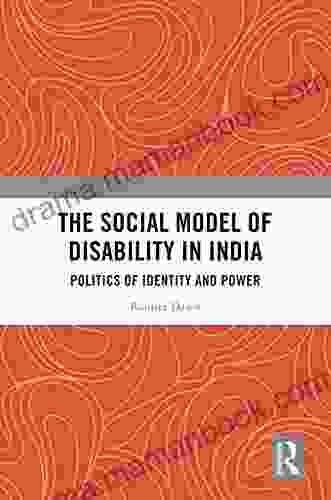The Politics of Identity and Power

The term "identity politics" has become increasingly prevalent in recent years, often used to describe the political mobilization of individuals based on shared identities, such as race, gender, sexual orientation, religion, or disability. However, the concept of identity politics extends far beyond simply recognizing and embracing diversity; it also encompasses the exploration of how power structures intersect with and shape our sense of self and belonging.
In this article, we will delve into the intricate interplay between identity and power, examining the complexities of personal narratives, social constructs, and political implications. We will explore how our identities are both shaped by and reflective of the power dynamics at play in society, and how these intersections influence our experiences, perceptions, and opportunities.
5 out of 5
| Language | : | English |
| File size | : | 1421 KB |
| Text-to-Speech | : | Enabled |
| Enhanced typesetting | : | Enabled |
| Word Wise | : | Enabled |
| Print length | : | 215 pages |
Identity: A Complex and Multifaceted Concept
Identity is not a static concept but rather a fluid and evolving aspect of human existence. It is shaped by a multitude of factors, including our personal experiences, cultural background, social interactions, and political context. Our identities are both individual and collective, rooted in both our unique experiences and the shared experiences of our communities.
Personal narratives play a crucial role in shaping our identities. The stories we tell about ourselves, our experiences, and our aspirations form the foundation of our self-perception and the way we are perceived by others. These narratives can be empowering or disempowering, depending on the extent to which they align with or challenge societal norms and expectations.
Social constructs also significantly influence our identities. Gender, race, class, and other social categories are not inherent or biological but rather constructed and reinforced through societal norms, institutions, and practices. These constructs shape our expectations, opportunities, and experiences, often creating hierarchies of power and privilege.
Power: A Dichotomy of Empowerment and Oppression
Power is a multifaceted concept that encompasses both the ability to influence or control others and the capacity to resist or challenge those who attempt to do so. Power can be wielded through various mechanisms, ranging from physical force to economic coercion to ideological manipulation.
Empowerment is the process of gaining or increasing power. It involves developing awareness of one's own power and the power dynamics at play, as well as acquiring the skills and resources necessary to exercise that power effectively. Empowerment can be both individual and collective, leading to increased self-advocacy, community mobilization, and social transformation.
Oppression, on the other hand, is the systematic and institutionalized exercise of power to marginalize and disempower certain individuals or groups. It can manifest in various forms, including discrimination, prejudice, and violence. Oppression perpetuates power imbalances and creates barriers to opportunity and participation for those who are targeted.
The Interplay of Identity and Power
Identity and power are inextricably linked. Our identities are shaped by the power structures we navigate, and in turn, our identities can influence the way we wield or resist power.
Those who belong to marginalized or oppressed groups often face challenges and barriers that stem from their identities. They may experience discrimination, exclusion, and limited access to resources and opportunities. These experiences can shape their self-perception and their understanding of their place in society.
Conversely, those who belong to privileged or dominant groups may have an easier time accessing power and resources. They may be more likely to hold positions of authority, have their voices heard, and influence decision-making processes. These experiences can reinforce their sense of entitlement and privilege.
Identity Politics: A Tool for Empowerment and Liberation
Identity politics is a political approach that emphasizes the importance of shared identities and experiences in shaping political action. It seeks to empower marginalized groups by recognizing and addressing their unique challenges and perspectives.
Identity politics can take various forms, such as organizing around specific issues that disproportionately affect certain groups, advocating for policies that promote equality and inclusion, and challenging oppressive systems and institutions.
Critics of identity politics argue that it leads to division and fragmentation, undermining the possibility of building broad-based coalitions for social change. They contend that focusing on group differences can reinforce stereotypes and create hierarchies of victimhood.
However, proponents of identity politics argue that it is essential for addressing the specific needs and experiences of marginalized groups. They contend that it provides a platform for these groups to articulate their concerns, build solidarity, and demand justice.
The Future of Identity Politics
The future of identity politics is uncertain. It faces challenges from both external forces, such as the rise of nationalism and populism, and internal divisions, such as debates over intersectionality and the inclusion of marginalized groups within dominant identity categories.
However, identity politics remains a powerful tool for empowerment and liberation. It can help to create a more inclusive and just society by challenging oppressive systems, highlighting the experiences of marginalized groups, and empowering individuals to participate fully in the political process.
The politics of identity and power is a complex and ever-evolving field. Identity is a multifaceted and dynamic concept, shaped by both personal experiences and social constructs. Power is a double-edged sword, capable of both empowerment and oppression. The interplay between identity and power influences our lives in countless ways, shaping our experiences, opportunities, and perceptions.
Identity politics is a tool for understanding and addressing the challenges faced by marginalized groups. It can be a powerful force for empowerment and liberation, but it also faces challenges from both external and internal forces. The future of identity politics is uncertain, but it remains an essential framework for creating a more just and equitable society.
5 out of 5
| Language | : | English |
| File size | : | 1421 KB |
| Text-to-Speech | : | Enabled |
| Enhanced typesetting | : | Enabled |
| Word Wise | : | Enabled |
| Print length | : | 215 pages |
Do you want to contribute by writing guest posts on this blog?
Please contact us and send us a resume of previous articles that you have written.
 Top Book
Top Book Novel
Novel Fiction
Fiction Nonfiction
Nonfiction Literature
Literature Paperback
Paperback Hardcover
Hardcover E-book
E-book Audiobook
Audiobook Bestseller
Bestseller Classic
Classic Mystery
Mystery Thriller
Thriller Romance
Romance Fantasy
Fantasy Science Fiction
Science Fiction Biography
Biography Memoir
Memoir Autobiography
Autobiography Poetry
Poetry Drama
Drama Historical Fiction
Historical Fiction Self-help
Self-help Young Adult
Young Adult Childrens Books
Childrens Books Graphic Novel
Graphic Novel Anthology
Anthology Series
Series Encyclopedia
Encyclopedia Reference
Reference Guidebook
Guidebook Textbook
Textbook Workbook
Workbook Journal
Journal Diary
Diary Manuscript
Manuscript Folio
Folio Pulp Fiction
Pulp Fiction Short Stories
Short Stories Fairy Tales
Fairy Tales Fables
Fables Mythology
Mythology Philosophy
Philosophy Religion
Religion Spirituality
Spirituality Essays
Essays Critique
Critique Commentary
Commentary Glossary
Glossary Bibliography
Bibliography Index
Index Table of Contents
Table of Contents Preface
Preface Introduction
Introduction Foreword
Foreword Afterword
Afterword Appendices
Appendices Annotations
Annotations Footnotes
Footnotes Epilogue
Epilogue Prologue
Prologue Amy Lowell
Amy Lowell Inadvisably Compelled
Inadvisably Compelled Amy Rafferty
Amy Rafferty Bror Erickson
Bror Erickson Icy Lee
Icy Lee Warren Ellis
Warren Ellis Shannon Mayer
Shannon Mayer James Tynion Iv
James Tynion Iv Elton T E Barker
Elton T E Barker Brad Lee
Brad Lee James Randell
James Randell Immanuel Kant
Immanuel Kant Gavin T L Brown
Gavin T L Brown Donald R Bear
Donald R Bear Sterling Hayden
Sterling Hayden Giovanni Rigters
Giovanni Rigters Matthew Marchon
Matthew Marchon Daniella Platt
Daniella Platt Matthew Lynn
Matthew Lynn Daryl K Gessner
Daryl K Gessner
Light bulbAdvertise smarter! Our strategic ad space ensures maximum exposure. Reserve your spot today!
 Brandon CoxFollow ·10.7k
Brandon CoxFollow ·10.7k Hunter MitchellFollow ·12k
Hunter MitchellFollow ·12k Cooper BellFollow ·7.3k
Cooper BellFollow ·7.3k Nikolai GogolFollow ·9.6k
Nikolai GogolFollow ·9.6k Sam CarterFollow ·12.7k
Sam CarterFollow ·12.7k Jerome BlairFollow ·10.6k
Jerome BlairFollow ·10.6k Derek BellFollow ·4.4k
Derek BellFollow ·4.4k Colton CarterFollow ·4.1k
Colton CarterFollow ·4.1k

 Jesus Mitchell
Jesus MitchellThe Diabetics Menu: Your Low Carb Options
If you're living with diabetes, you may be...

 Danny Simmons
Danny SimmonsThe Sam Reilly Collection: A Treasure Trove of...
In the realm of...

 Vic Parker
Vic ParkerThe Shepherdess of Siena: The Extraordinary Life of Saint...
Catherine of Siena, known as the...

 Christian Carter
Christian CarterDive into the Mystical World of Meraki Syren: A Literary...
A Literary Odyssey Through the Depths...

 Eric Hayes
Eric HayesSimplest Method on How to Remove Credit Cards from Your...
Do you have multiple credit cards...
5 out of 5
| Language | : | English |
| File size | : | 1421 KB |
| Text-to-Speech | : | Enabled |
| Enhanced typesetting | : | Enabled |
| Word Wise | : | Enabled |
| Print length | : | 215 pages |














